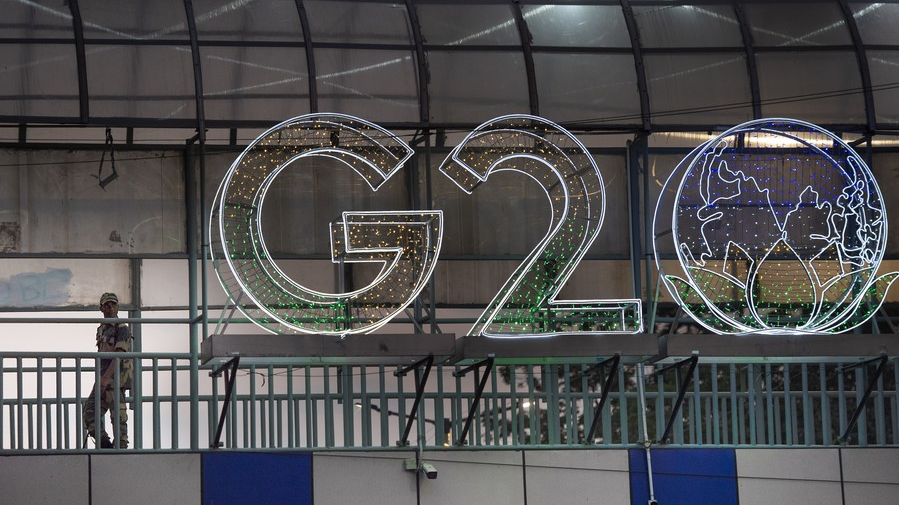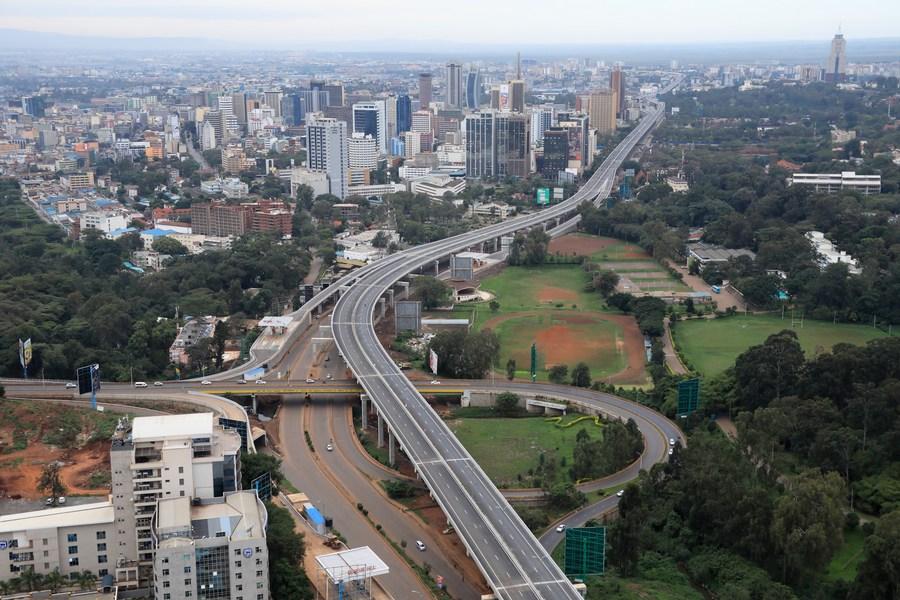
An Indian paramilitary trooper stands guard near the logo of the Group of 20 (G20) summit in New Delhi, India, September 7, 2023. [Photo/Xinhua]
By Stephen Ndegwa
The Group of 20 world's largest economies, otherwise known as the G20, has just held its annual summit from September 9 to 10 in New Delhi, India. But this summit was different due to its focus on the admission of the African Union (AU) as a permanent member of the group of eminent global economies.
The admission of AU in the G20 was a foregone conclusion. The idea was first mooted by United States President Joe Biden on December 15, 2022. It was a soul-searching moment for Biden who said that his proposal was an effort to reinvigorate ties with a region that had been overlooked and treated as a second-class global citizen.
India's Prime Minister Narendra Modi echoed Biden's appeal about eight months later on August 27 when addressing the Business 20 meeting, the official G20 dialogue forum with the global business community. While calling for AU's inclusion, Modi also used the opportunity to tout India as the "solution" to an "efficient and trusted global supply chain," amid the increasingly complicated international socioeconomic situation.
The G20 consists of 19 countries and the European Union. However, just like South Africa was the only African member of BRICS – alongside the world's largest emerging economies of Brazil, Russia, India and China – before the recent admission of two new members, it was the only member of the G20 on the continent.
As previously constituted, the G20 accounted for about 85 percent of global gross domestic product (GDP), more than 75 percent of international trade, an estimated two-thirds of the world's population, and 60 percent of the world's landmass. With the AU joining the G20, the group will obviously push these percentages substantially. Indeed, Africa has now entered into mainstream international affairs.
The "G21," if you may, is a great opportunity for African countries to entrench themselves further in the global trade and economic system, particularly under the establishment of the African Continental Free Trade Area. In 2022, Africa had a collective about $3 trillion GDP in a market consisting of the world's largest free trade area by population, at more than 1.3 billion people. It is hoped that the G20 will help Africa crack the global markets for its products.

A section of the Nairobi Expressway built by China Road and Bridge Corporation in Nairobi, Kenya, May 8, 2022. [Photo/Xinhua]
Conversely, the admission challenges Africa to increase its efforts and commitment towards industrialization. For Africa to match the growth levels of its counterparts, African countries must add value to their raw materials to increase their export revenues; Other G20 members should also contribute by building the continent's capacity in producing exports of finished goods and import substitution.
Africa needs a strategy of maximizing the benefits of belonging to global bodies. Beyond such memberships, the continent should hold sway in decisions that affect its development without external influence. It will also take genuine political will from the Global North to create space for Africa on the global stage. As Biden rightly pointed out in December, "Africa belongs to the table in every room where global challenges are being discussed, and in every institution where discussions are taking place."
Looking ahead, what role can Africa play in the G20 agenda for 2023, which includes accelerating climate action, mitigating the impact of geopolitics on food and energy security, providing more credit to developing countries through multilateral institutions and restructuring the global debt architecture as an international framework for cryptocurrencies.
Africa needs a bigger stake in global affairs by being part of decision making processes in organizations like the United Nations Security Council (UNSC). In February, UN Secretary-General Antonio Guterres appealed to member states to grant the AU a permanent seat on the UNSC. Africa has three elected members out of 10 non-permanent seats in the UNSC.
Experts believe that some of the new interest in Africa's wellbeing stems from the success of China-Africa relations through the Forum on China–Africa Cooperation (FOCAC). China has been Africa's largest trading partner for 14 consecutive years, and has contributed more than 20 percent to Africa's growth for several years.
Many flagship projects are complete or underway including the AU Conference Center in Addis Ababa, Ethiopia. Cooperation in other areas, from science, education, culture, and health, to peace, people-to-people exchanges, and security, have made significant strides.
The FOCAC model is similar to, or has been replicated across countries and regions including the U.S. itself, the United Kingdom, Russia, India, Japan, the Arab League, Türkiye, South Korea, South America, and Indonesia. Out of all these, however, the FOCAC partnership is the most structured and has recorded concrete and measurable win-win outcomes in the areas of cooperation.
Ultimately, what is in the G20 for Africa? The continent awaits the partnership that will be unveiled at the summit, which is hoped will be an upgrade from the existing partnership. The continent anticipates that the G20-Africa platform will not be a talk shop with empty promises and shifting goalposts. If it is well structured and contains sincere intentions, the new "G21" will be a boon for Africa's struggling social and economic development.
Stephen Ndegwa, a special commentator on current affairs for CGTN, is the Executive Director of South-South Dialogues, a Nairobi-based communications development think tank.

 中文
中文



